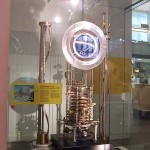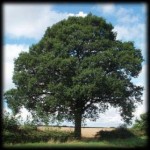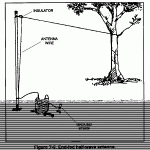 …we’re all dead, so goes the old joke.
…we’re all dead, so goes the old joke.
I’ve found myself thinking of ‘the long run’ increasingly often over the last year, and I’m not sure why. I think partially it’s due to having children around on a reasonably regular basis for the first time; I’ve found myself thinking more of the world that they will grow up in to, and how the activities of the human race in my lifetime will have influenced that world – for better or worse. some of you may recognise the image on the left – it’s a picture of a model of the ‘Clock of the Long Now’ – a timepiece designed to keep reasonably accurate time for 10,000 years. I like the idea of thinking that far ahead – whether it’s realistic or not is the question, I guess.
Years ago I remember reading that when the ‘big’ cathedrals were built – places like Notre Dame in Paris, or theBasilica di Santa Maria del Fiore in Florence – it was taken as a given that some of the people who started building the place would not live long enough to see it completed. The Basilica, for example, took 170 years from inception to completion. Imagine – a life expectancy of maybe 40 was pretty good going for those days, so it would be possible for 4 or 5 generations of a family to work on the building, most of whom knew that they were committing their skills and lifetime to something they would never see completed. And this in a time when the Black death was all over Europe. I imagine that part of what drove people was faith; a belief that what happened in your life wasn’t the end of things, but just the beginning, and that building such edifices would help ensure your soul would be well received in Paradise!
Gardens are the same – many formal gardens literally take 100 years to mature to the vision that the garden designer envisaged. And the owner of the land on which the garden was being built and who was paying for the garden would know that he was planning for the future, and leaving behind (and paying for) a legacy that he would never truly enjoy. There’s a rather nice comment about the wisdom of a society that plants trees for the future in this blog entry from November.
It’s the combination of altruism and faith in the future that fascinates me; it is a combination of values that I think is lacking today. We seem to have ended up in a culture of short-termism. Which is incredibly ironic when we live so much longer than did our ancestors; maybe we’re just not so sure about our future prospects, or maybe it’s our Governments thinking in 4 year chunks. But we don’t seem to have the faith to build for the future anymore. I don’t really see anything being built that will first of all survive more than a century or so, and certainly nothing of the scale and majesty of your Duomos, Notre Dames or Towers of London.
It’s a great irony that we might leave so little that survives more than a few centuries that our descendants of a thousand years hence (should we leave any behind) might regard the times we’re now living in in the same way that we regard the so-called ‘Dark Ages’.

 …a thing as lovely as a tree, goes the poem. We’ve been blessed this year by squirrels in our garden. We live in a suburb of Sheffield with lots of trees which give a great playground for the squirrels, roosting places for birds, sources of sound effects when the wind blows through the leaves and variable satellite TV quality in the spring and summer when the leaves on a particular nearby tree get in the way of the incoming satellite TV signal!
…a thing as lovely as a tree, goes the poem. We’ve been blessed this year by squirrels in our garden. We live in a suburb of Sheffield with lots of trees which give a great playground for the squirrels, roosting places for birds, sources of sound effects when the wind blows through the leaves and variable satellite TV quality in the spring and summer when the leaves on a particular nearby tree get in the way of the incoming satellite TV signal! When I was kid my main regret about our garden was the lack of a tree at the end of it. It was a loooong garden, just right for a long-wire aerial to support my interest in short wave radio. Unfortunately, there was no tree. the traditional supports for a long wire aerial for short wave listening, as portrayed in numerous books, was a house at one end – check! – and a tree at the other. Sadly, I had no tree, my parents objected to my plan of acquiring a telegraph pole and planting it at the end of the garden, and so my aerial stopped where the last washing line support pole was. Ah well….
When I was kid my main regret about our garden was the lack of a tree at the end of it. It was a loooong garden, just right for a long-wire aerial to support my interest in short wave radio. Unfortunately, there was no tree. the traditional supports for a long wire aerial for short wave listening, as portrayed in numerous books, was a house at one end – check! – and a tree at the other. Sadly, I had no tree, my parents objected to my plan of acquiring a telegraph pole and planting it at the end of the garden, and so my aerial stopped where the last washing line support pole was. Ah well….